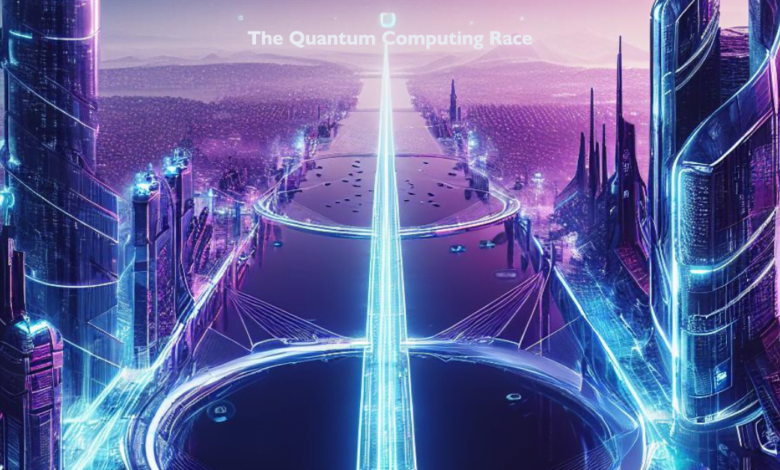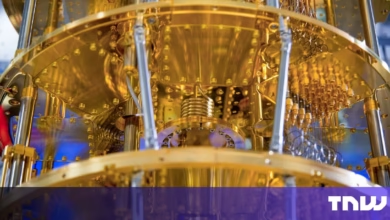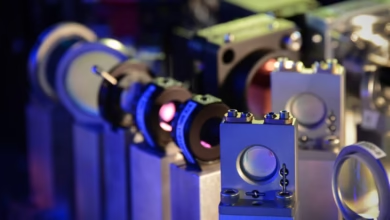
Hold onto your hats, dummies, because we’re about to take a mind-bending trip into the world of quantum computing. Forget your boring old bits, we’re talking qubits – the superheroes of the computing world who can be on, off, or maybe all at once (thanks to superposition). And like the ultimate cosmic tag team, they can be entangled, sharing a spooky connection no matter the distance.
Imagine designing drugs that are like laser-guided missiles, personalized for each patient. Or cracking codes that would take regular computers longer than the universe has existed. We’re talking unbreakable fabrics, super-efficient solar panels, materials that would make science fiction blush – the possibilities are as endless as your imagination.
A glitch in the matrix!
Building these quantum contraptions is like trying to herd hyperactive butterflies in a tornado. They’re delicate, prone to errors (we call them tantrums), and figuring out how to use them is like writing instructions for a martian orchestra. It’s a whole new language, and we’re still learning the alphabet!
The quantum race is on!
Tech giants like Google, IBM, and Microsoft are pouring billions into this cosmic race, and there’s been some serious progress:
- Google just achieved “quantum supremacy,” proving their machine can solve a problem impossible for even the beefiest classical computer. Think of it as a qubit flexing its muscles.
- Researchers have developed a new type of qubit that’s crazy accurate, like a quantum sharpshooter hitting bullseyes blindfolded. This could be the key to keeping those tantrums under control.
- Scientists have even managed to control and manipulate “spin waves” on a chip using superconductors. It’s like surfing the quantum waves, a mind-blowing feat that opens doors to whole new qubit playgrounds.

And just this week, going a step further, IBM made a monumental announcement: They are developing an even more powerful chip known as Condor that will have 1,121 superconducting qubits on a single chip.
This is a colossal leap forward, as it will be the first quantum computer to break the 1,000-qubit barrier. It’s like going from a tricycle to a Formula One car – a quantum leap indeed that marks a pivotal moment in the evolution of quantum computing, paving the way for even more groundbreaking discoveries in the years to come. With this new chip, IBM hopes to tackle even more complex problems that were once thought to be intractable, such as:
- Developing new materials with extraordinary properties: Imagine materials that are incredibly strong yet lightweight, or that can conduct electricity without resistance – the possibilities are limitless.
- Designing next-generation drugs that target diseases with unprecedented precision: Personalized medicine could reach new heights, with treatments tailored to each patient’s unique genetic makeup.
- Breaking even more codes, potentially revolutionizing cryptography and cybersecurity: The security of our online world could be vastly enhanced, making it much harder for hackers to breach our digital defenses.
This giant leap towards the quantum future is a testament to the amazing work of scientists and engineers around the world, who are pushing the boundaries of what’s possible.
So, is this the singularity, the robotic uprising we’ve been warned about?
Fear not, your trusty laptop is still safe for now. But quantum computing is undoubtedly the coolest kid on the tech block, and it’s rewriting the rules. It’s not just about building faster computers; it’s about rewriting the laws of physics and venturing into the unknown.
This is just the beginning, dummies. We’re about to witness a revolution, and you’re invited to the front row seat. Buckle up, because the future is quantum, and it’s gonna be one heck of a ride!
Jargon Buster
| Jargon | Definition |
|---|---|
| Qubit | The basic unit of quantum information, analogous to a classical bit |
| Superposition | The ability of a quantum system to exist in multiple states at the same time |
| Entanglement | A quantum phenomenon where two or more qubits are linked together in such a way that they share the same fate, no matter how far apart they are |
| Quantum supremacy | The ability of a quantum computer to perform a calculation that is impossible for a classical computer to perform in a reasonable amount of time |
| Tantrum | An error in a quantum system that can cause it to malfunction |
| Qubit sharpshooter | A qubit that is very accurate and reliable |
| Spin wave | A wave of collective magnetic moments in a material, such as a superconductor |
| Quantum race | The competition between different companies and research groups to develop the most powerful quantum computers |
| 1,121 qubits | A measure of the size of a quantum computer, referring to the number of qubits it contains |
| Intractable | Impossible to solve or deal with |
| Personalized medicine | Tailoring medical treatments to the individual patient’s genetic makeup |
| Breaking codes | Deciphering encrypted messages |
| Cryptography | The study of secure communication techniques |
| Cybersecurity | The protection of computer systems and networks from attacks |






